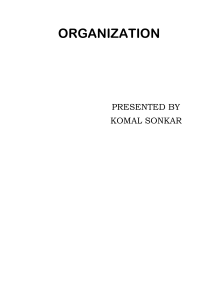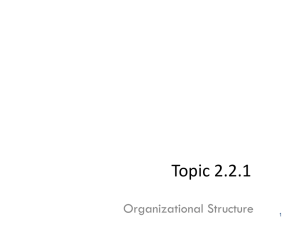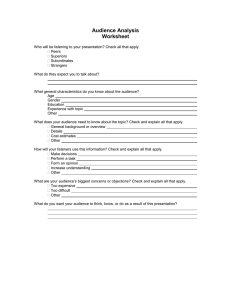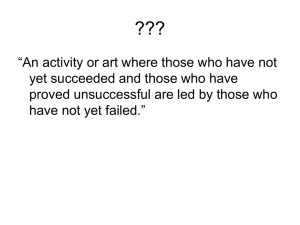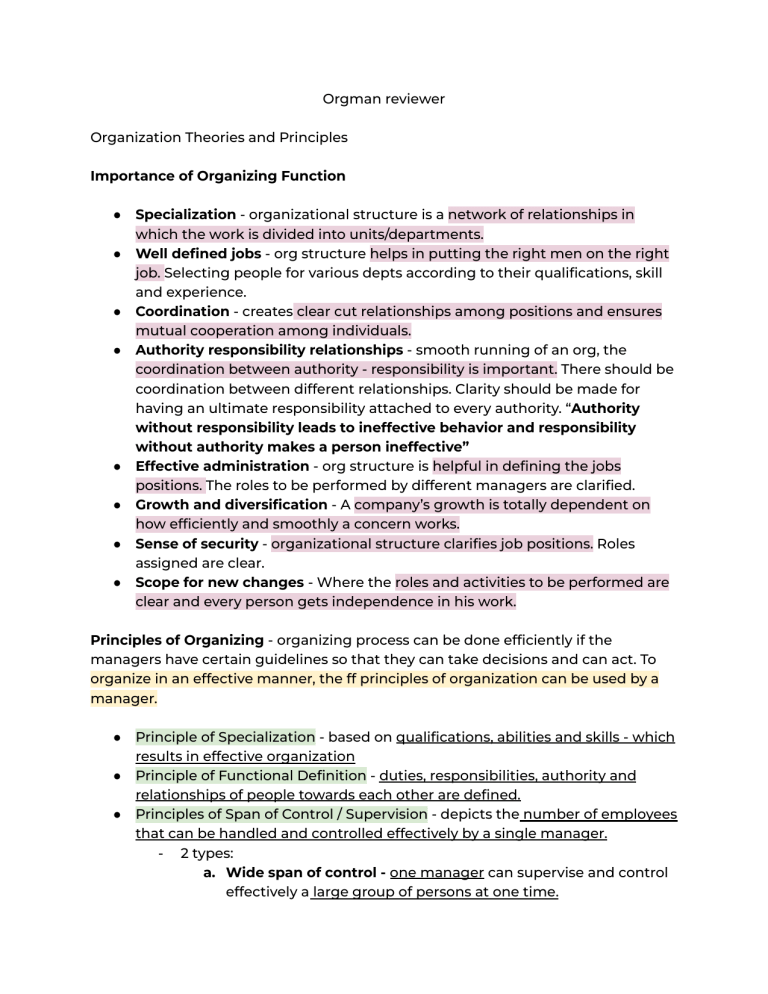
Orgman reviewer Organization Theories and Principles Importance of Organizing Function ● ● ● ● ● ● ● ● Specialization - organizational structure is a network of relationships in which the work is divided into units/departments. Well defined jobs - org structure helps in putting the right men on the right job. Selecting people for various depts according to their qualifications, skill and experience. Coordination - creates clear cut relationships among positions and ensures mutual cooperation among individuals. Authority responsibility relationships - smooth running of an org, the coordination between authority - responsibility is important. There should be coordination between different relationships. Clarity should be made for having an ultimate responsibility attached to every authority. “Authority without responsibility leads to ineffective behavior and responsibility without authority makes a person ineffective” Effective administration - org structure is helpful in defining the jobs positions. The roles to be performed by different managers are clarified. Growth and diversification - A company’s growth is totally dependent on how efficiently and smoothly a concern works. Sense of security - organizational structure clarifies job positions. Roles assigned are clear. Scope for new changes - Where the roles and activities to be performed are clear and every person gets independence in his work. Principles of Organizing - organizing process can be done efficiently if the managers have certain guidelines so that they can take decisions and can act. To organize in an effective manner, the ff principles of organization can be used by a manager. ● ● ● Principle of Specialization - based on qualifications, abilities and skills - which results in effective organization Principle of Functional Definition - duties, responsibilities, authority and relationships of people towards each other are defined. Principles of Span of Control / Supervision - depicts the number of employees that can be handled and controlled effectively by a single manager. - 2 types: a. Wide span of control - one manager can supervise and control effectively a large group of persons at one time. Features: 1. Less overhead cost of supervision 2. Prompt response from the employees 3. Better Communication 4. Better Supervision 5. Better coordination 6. Suitable for repetitive jobs - One manager can effectively and efficiently handle a large number of subordinates at one time. b. Narrow span of control - the work and authority is divided amongst many subordinates and a manager doesn’t supervise a very big group of people under him. Features 1. Work requires tight control and supervision 2. Coordination is difficult 3. Communication gaps can come 4. Messages can be distorted 5. Specialization work can be achieved Factors influencing span of control: - Managerial abilities - concerns where managers are capable, qualified and experienced, wide span of control is always helpful. - Competence of subordinates- Where the subordinates are capable and competent and their understanding levels are proper, the subordinates tend to very frequently visit the superiors for solving their problems. - Nature of work- If the work is of repetitive nature, a wide span of supervision is more helpful. On the other hand, if work requires mental skill or craftsmanship, tight control and supervision is required in which narrow span is more helpful. - Delegation of authority- When the work is delegated to lower levels in an efficient and proper way, confusions are less and congeniality of the environment can be maintained. In such cases, wide span of control is suitable - Degree of decentralization- Decentralization is done in order to achieve specialization in which authority is shared by many people and managers at different levels. ● Principle of Scalar Chain - chain of command/authority that flows from top to bottom. Wastage of resources are minimized, communication is affected, ● overlapping of work is avoided and easy organization takes place. Helps facilitate workflow in an organization which helps in achievement of effective results. Principle of Unity of Command - implies one subordinate = one superior relationship. Helps in an effective combination of resources that is physical, financial resources which helps in easy coordination - effective org. Delegation of Authority - in order to meet targets, a manager should delegate authority. - Means division of authority and power downwards to the subordinate. Entrusting someone else to do parts of your job. Can be defined as subdivision and sub-allocation of powers to the subordinates in order to achieve effective results. Elements of delegation: 1. Authority - power and right of a person to use and allocate resources efficiently, to take decisions and give orders to achieve the goals. 2. Authority must be well defined - should know what is the scope of their authority and avoid to misultilize it. 3. Authority always flows from top to bottom - authority should be accompanied with an equal amount of responsibility. Accountability still rests with the person having the utmost authority. 4. Responsibility - duty of the person to complete the task assigned to him. A person that is given responsibility must ensure that he accomplishes the tasks assigned to him. 5. Responsibility flows from bottom to top - middle level and lower level management holds more responsibility. 6. Accountability - means giving explanations for any variance in the actual performance from the expectations set. 7. Accountability cannot be delegated - example: A is given a task with sufficient authority. A delegates the task to b and asks him to do it well. B is responsible. The accountability still rests with A. Top level management = most accountable Accountability can’t be escaped. For achieving delegation, a manager has to work in a system and has to perform the ff: 1. Assignment of tasks and duties - the delegator first tries to define the task and duties to the subordinate. Clarity of duty. 2. Granting of authority - every subordinate should be given independence to carry the task given to him by his superiors. 3. Creating responsibility and accountability - at the same time, they should have an obligation towards the duties assigned to them. 4. Accountability arises out of responsibility and responsibility arises out of authority. For every authority, an equal accountability is attached. Responsibility - bottom to top Authority - top to bottom Authority - legal right of a person or a superior to command his subordinates. It is attached to the position of a superior in concern. Can be delegated by a superior to a subordinate. Responsibility - obligation of subordinate to perform the work assigned to him. Arises out of superior-subordinate relationship in which subordinate agrees to carry out duty given to him. Cannot be shifted and is absolute. Principles of Delegation - few guidelines which can be a help the manager in the process of delegation 1. Principle of result expected - suggests that every manager before delegating the powers to the subordinate should be able to clearly define the goals as well as the results expected from them. Goals and targets should be completely and clearly defined and the standards should be notified clearly. 2. Principle of Parity of Authority and Responsibility - the manager should keep a balance between authority and responsibility. Both should go hand in hand. 3. Principle of Absolute Responsibility - the authority can be delegated but responsibility cannot be delegated by managers to his subordinates which means responsibility is fixed. The manager at every level no matter what is his authority, is always responsible to his superior for carrying out his task by delegating the powers. - Every superior is responsible for the acts of their subordinates and are accountable to their superiors therefore superiors cannot pass the blame to the subordinates even if he has delegated certain powers. 4. Principle of Authority Level - manager should exercise his authority within the framework given. Managers should consult their superiors with those matters of which the authority isn’t given.
